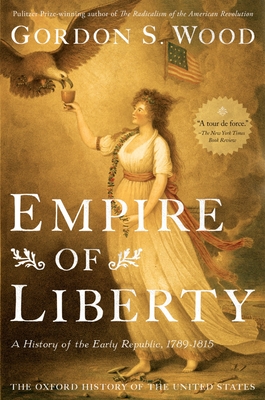The Oxford History of the United States is
by far the most respected multi-volume history of our nation. The series
includes three Pulitzer Prize winners, two New York Times bestsellers,
and winners of the Bancroft and Parkman Prizes. Now, in the newest
volume in the series, one of America's most esteemed historians, Gordon
S. Wood, offers a brilliant account of the early American Republic,
ranging from 1789 and the beginning of the national government to the
end of the War of 1812.
As Wood reveals, the period was marked by tumultuous change in all aspects of American life--in politics, society, economy, and culture. The men who founded the new government had high hopes for the future, but few of their hopes and dreams worked out quite as they expected. They hated political parties but parties nonetheless emerged. Some wanted the United States to become a great fiscal-military state like those of Britain and France; others wanted the country to remain a rural agricultural state very different from the European states. Instead, by 1815 the United States became something neither group anticipated. Many leaders expected American culture to flourish and surpass that of Europe; instead it became popularized and vulgarized. The leaders also hope to see the end of slavery; instead, despite the release of many slaves and the end of slavery in the North, slavery was stronger in 1815 than it had been in 1789. Many wanted to avoid entanglements with Europe, but instead the country became involved in Europe's wars and ended up waging another war with the former mother country. Still, with a new generation emerging by 1815, most Americans were confident and optimistic about the future of their country.
Integrating all aspects of life, from politics and law to the economy and culture, Empire of Liberty offers a marvelous account of this pivotal era when America took its first unsteady steps as a new and rapidly expanding nation.
Gerald says:
"This volume covers the remarkable period from 1789 to 1815, when the intentions of the Founding Fathers meet the unexpected consequences of democracy. In our current political climate, where constitutional issues and original intent are bandied around by both political parties, I thought to myself, I should stop repeating slickly processed ideas and actually learn what forces truly formed the foundations of our government. This book has been a most satisfying and enlightening choice. It is a fascinating history that not only provides great insight into the rise of democratic self-interest and of the divisions of political party that still define us today, but also illuminates the distinctive twist that the republican experiment put on such social forces as religion and commerce."
As Wood reveals, the period was marked by tumultuous change in all aspects of American life--in politics, society, economy, and culture. The men who founded the new government had high hopes for the future, but few of their hopes and dreams worked out quite as they expected. They hated political parties but parties nonetheless emerged. Some wanted the United States to become a great fiscal-military state like those of Britain and France; others wanted the country to remain a rural agricultural state very different from the European states. Instead, by 1815 the United States became something neither group anticipated. Many leaders expected American culture to flourish and surpass that of Europe; instead it became popularized and vulgarized. The leaders also hope to see the end of slavery; instead, despite the release of many slaves and the end of slavery in the North, slavery was stronger in 1815 than it had been in 1789. Many wanted to avoid entanglements with Europe, but instead the country became involved in Europe's wars and ended up waging another war with the former mother country. Still, with a new generation emerging by 1815, most Americans were confident and optimistic about the future of their country.
Integrating all aspects of life, from politics and law to the economy and culture, Empire of Liberty offers a marvelous account of this pivotal era when America took its first unsteady steps as a new and rapidly expanding nation.
Gerald says:
"This volume covers the remarkable period from 1789 to 1815, when the intentions of the Founding Fathers meet the unexpected consequences of democracy. In our current political climate, where constitutional issues and original intent are bandied around by both political parties, I thought to myself, I should stop repeating slickly processed ideas and actually learn what forces truly formed the foundations of our government. This book has been a most satisfying and enlightening choice. It is a fascinating history that not only provides great insight into the rise of democratic self-interest and of the divisions of political party that still define us today, but also illuminates the distinctive twist that the republican experiment put on such social forces as religion and commerce."


No comments:
Post a Comment